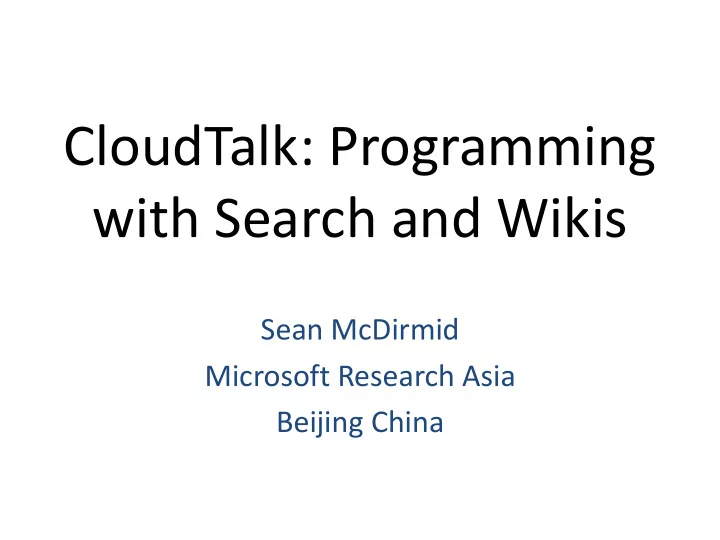

CloudTalk: Programming with Search and Wikis Sean McDirmid Microsoft Research Asia Beijing China
Problem • World of code keeps getting bigger – More libraries and frameworks – More code snippets and samples – More complexity • Niche (long tail) reuse difficult
Cloud-specific Problems • Multitude of services – E.g., REST social/location services like Facebook, Yelp, Foursquare, Flickr, Gowalla, Eventful, … – Which service provides what we want? • (Possibly multiple services) • Services have custom schemas – user_name , user_first_name , user
Mashups
So what? • Claim: managing huge namespaces is one of the upcoming big challenges in PL – The namespace for whatever is available • What can we do about it?
Intellisense/Autocomplete
Intellisense/Autocomplete • Useful for browsing – R ecalling what’s in a local scope • Very local – Doesn’t apply to everything…like some library you don’t have yet.
Search
Search background • Find long-tail information – Obscure, niche, but pervasive • Search- assisted “Google” Memory – Not knowing something is less of a problem – Viable on-the-fly discovery and learning • Applied to PL?
Search and Code
Search and Code
Semantic Search Going Farther with Search
Autocomplete + Search
Limitations • External search disrupts flow • Context is valuable • Search as just a tool concern – PL design not applied • How about search being more like a PL? – WolframAlpha
WolframAlpha Limitations • Not much composition – The time derivative of PRC population • Not much abstraction – Lacks functions and variables • Very incomplete interface to Mathematica – Not a PL, but still…
Names vs. Identifiers • Identifiers – Just strings, meaning only by convention – “f” vs. “ integerToString • Names – Has meaning – Has synonyms that can be resolved – Keyword searchable • First-class naming in PL design?
More PL-ish Route to this conventions’ stalls that interest my pals
Word Sense Resolution route( this-convention.stalls.if (b => interest(my.pals, b) ) )
More PL-ish route( this-convention.stalls.if (b => interest(my.friends,b) ) )
More PL-ish route( this-convention.booths.if (b => interest(my.friends,b) ) )
More PL-ish map-route( this-convention.booths.if (b => show-interest(my.friends,b) ) )
Types and Search • Beyond simple procedure calls – Query results can have non-local consequences • Use types to track consequences – Query then involves type info
More PL-ish p : ui-panel s : p.slider p.layout = canvas … s.position = (50, 0)
ui-panel.slider <: More PL-ish ui-panel.element p : ui-panel s : p.slider p.layout = canvas … s.position = (50, 0) point position in ui-panel (layout = canvas).element
s <: ui-panel More PL-ish (layout = canvas).element p : ui-panel s : p.slider p.layout = canvas … s.position = (50, 0) point position in ui-panel (layout = canvas).element
More PL-ish p : ui-panel s : p.slider p.layout = canvas … s.position = top
placement in ui-panel More PL-ish (layout = dock).element p : ui-panel s : p.slider p.layout = canvas … s.position = top top, bottom, left, right placement
More PL-ish p : ui-panel s : p.slider p.layout = canvas … s.position = top ui-panel, slider, layout, canvas, position, top
More PL-ish p : ui-panel s : p.slider p.layout = canvas … s.position = top ui-panel, slider, element, layout, canvas, position, top, placement
position in ui-panel More PL-ish (layout = canvas).element p : ui-panel s : p.slider p.layout = canvas … s.position = top ui-panel, slider, element, layout, canvas, position, top, placement
position in ui-panel More PL-ish (layout = canvas).element p : ui-panel s : p.slider p.layout = canvas … s.position = top ui-panel, slider, element, layout, canvas, position, top, placement
More PL-ish p : ui-panel s : p.slider p.layout = canvas … s.position = top
More PL-ish p : ui-panel s : p.slider p.layout = dock … s.placement = top
More PL-ish p : ui-panel s : p.slider p.layout = canvas … s.position = north
More PL-ish p : ui-panel s : p.slider p.layout = dock … s.placement = top
More PL-ish p : ui-panel s : p.slider p.layout = canvas … s.position.y = 0
Searching with Types • Dependent typing – Dependent classes (Gasiunas, Mezini, Ostermann)
Next Step • Where to find things? – General Internet is too volatile – Review and transparency • Community convergence required – Diversity in naming and architecture makes reuse more difficult
The Code Wiki
Code wiki • Flat namespace – All definitions at the top-level – Disambiguate through richer naming • Everyone shares the same namespace – No separate libraries/modules/frameworks – No explicit import
Code wiki • Namespace is editable by all – Community reviewed, enhanced, refactored – Convergence of community vocabulary • Linking through pervasive search – Linking as key to wiki’s success
Eliminating Diversity • Consistent naming – Name new stuff like existing stuff • High-level declarative abstractions – Not expressive or powerful • Binding, non-recursive – Just easy to use
Conclusion • Programming Language Implementation (PLI) – Compiler or interpreter – Libraries (lots of them) and services* – IDE – Community • Consider in PL design
北京欢迎你 ! WELCOME TO BEIJING!
Recommend
More recommend